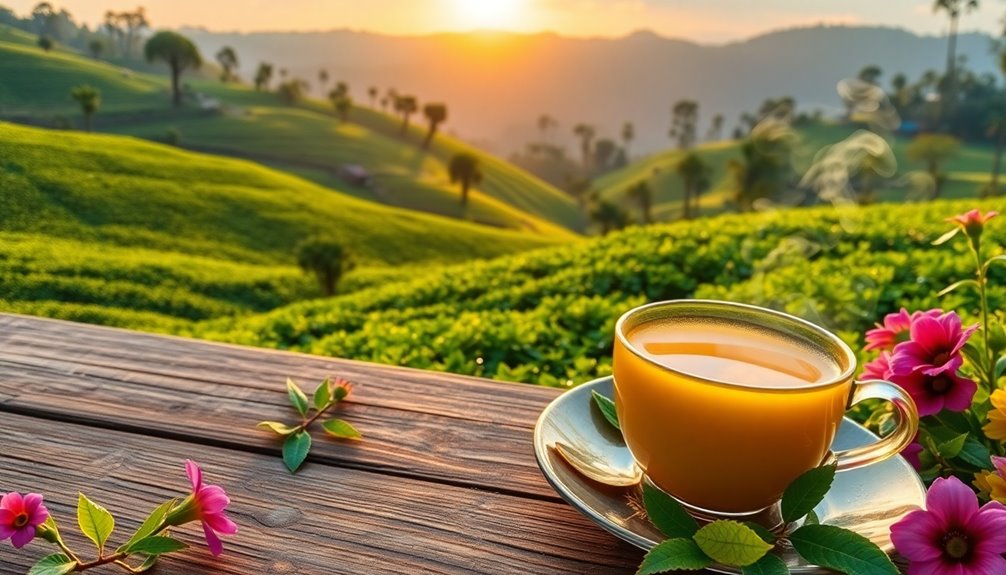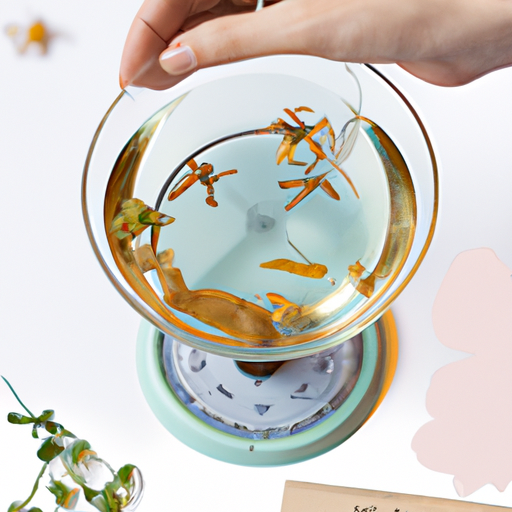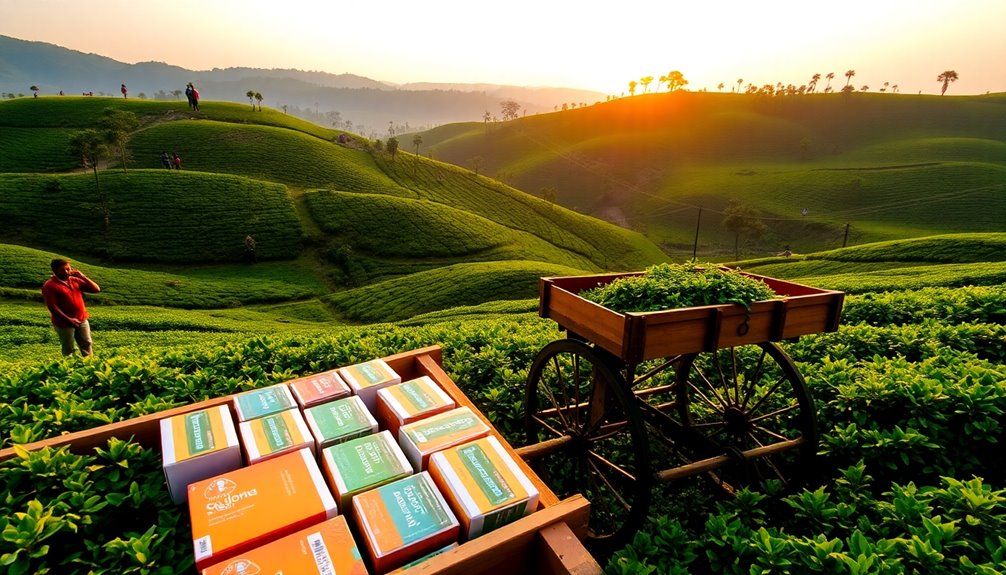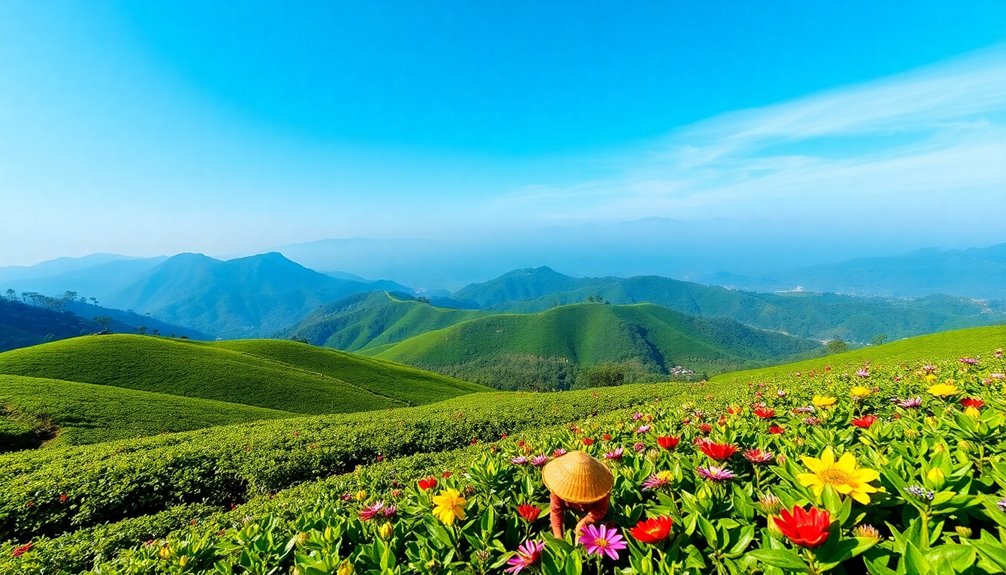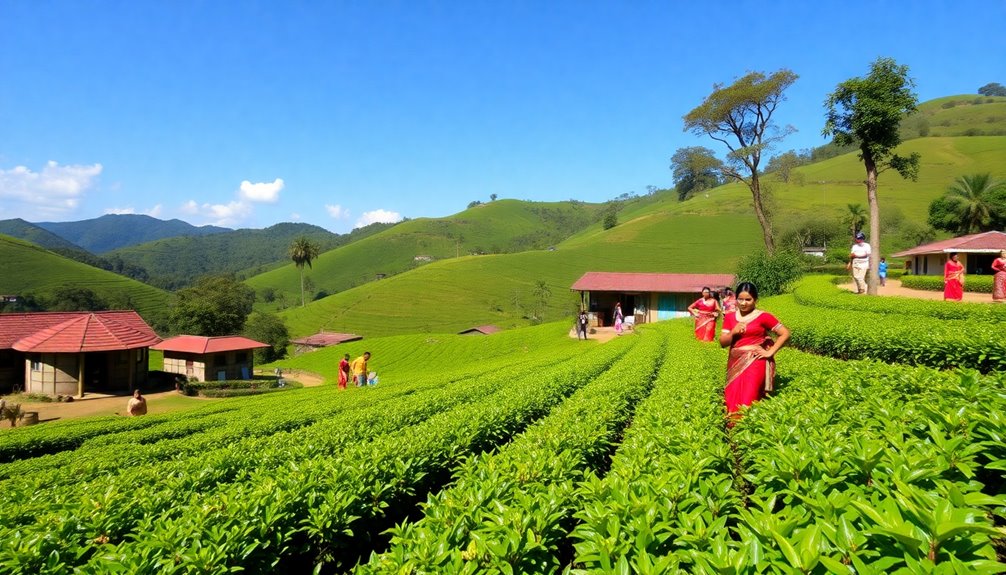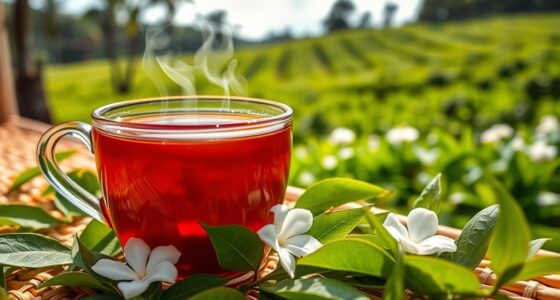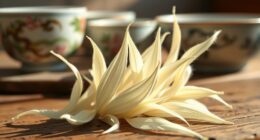Ceylon tea's flavor profile stands out with its vibrant and refreshing taste! You'll love the bright, brisk citrus notes that dance on your palate, perfect for any time of day. Its lovely amber hue isn't just pretty; it signals freshness and joy in every cup. Sourced from different elevations, you get to enjoy flavors ranging from light and delicate to bold and robust. Plus, each region has its own special twist, like the caramel-sweet notes from Ruhuna or the citrusy hints from Nuwara Eliya. Isn't that exciting? Keep exploring to discover even more about this delightful tea!
Key Takeaways
- Ceylon tea is known for its vibrant flavor profile, offering a robust and full-bodied taste that excites the palate.
- Distinctive citrus notes enhance the refreshing aftertaste, varying in intensity depending on the region of cultivation.
- The bright amber hue of Ceylon tea signifies freshness and quality, enhancing its visual appeal.
- Sourced from diverse elevations, Ceylon tea presents a range of flavors from light and delicate to strong and bold.
- Regional variations, such as Nuwara Eliya's citrusy notes and Ruhuna's caramel sweetness, contribute to its unique flavor experience.
Introduction
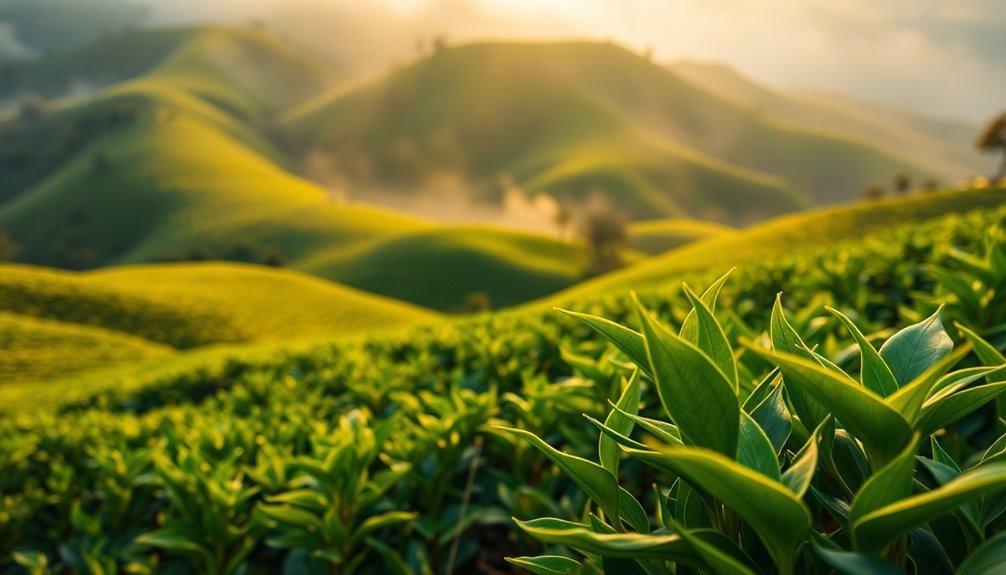
Ceylon tea, a gem of the tea world, offers a flavor experience that's both vibrant and refreshing. You'll find that this Sri Lankan tea is unique, with tea leaves that create a delightful aroma. When you sip Ceylon tea, you're greeted by a robust, full-bodied flavor that dances on your taste buds.
It's known for its bright and brisk taste, making it perfect for any time of day.
One of the exciting things about Ceylon tea is its variety! High-grown teas from places like Nuwara Eliya give you delicate, light-bodied flavors, while low-grown teas from Ruhuna pack a stronger punch.
This variety means there's a Ceylon tea for everyone!
Plus, the mild astringency adds a refreshing twist to your cup, keeping it enjoyable and lively.
The aftertaste can surprise you, often featuring floral notes that enhance your drinking experience.
Distinctive Citrus Notes Present
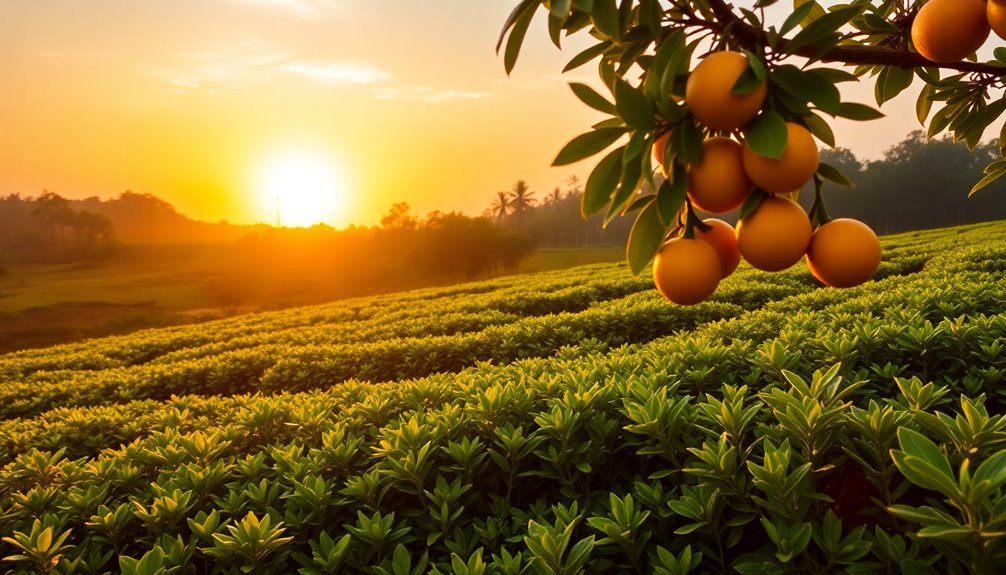
One of the standout features of Ceylon tea is its distinctive citrus notes that elevate the overall flavor profile. When you take a sip, you'll notice a bright and brisk taste that dances on your tongue. These citrus hints not only make the Ceylon tea taste delightful, but they also give it a refreshing aftertaste that tea enthusiasts adore!
Different regions in Sri Lanka create Ceylon tea with varying citrus intensity. High-grown teas, for example, often offer a lighter, more delicate citrus flavor. This balance of citrus notes adds complexity to the flavor of Ceylon tea, making each cup a pleasant and exciting experience.
What makes Ceylon tea truly special is its unique identity in the global tea market. Compared to other teas, like Indian Darjeeling, the citrus notes in Ceylon tea are more pronounced, which sets it apart.
Bright Amber Hue
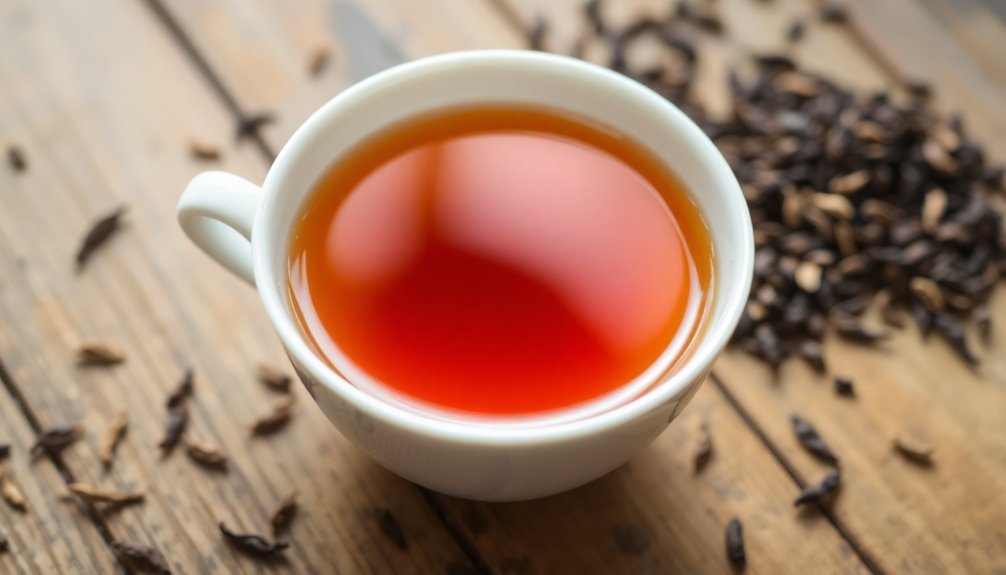
The bright amber hue isn't just for show; it also tells you about the tea's freshness and vibrant flavor profile.
When you see that lovely color in your cup, it's a sign that you're in for a delightful experience!
So, whether you're enjoying a quiet afternoon or celebrating with family, the bright amber hue of Ceylon tea will surely brighten your day.
Cheers to that!
Sourced From Diverse Elevations
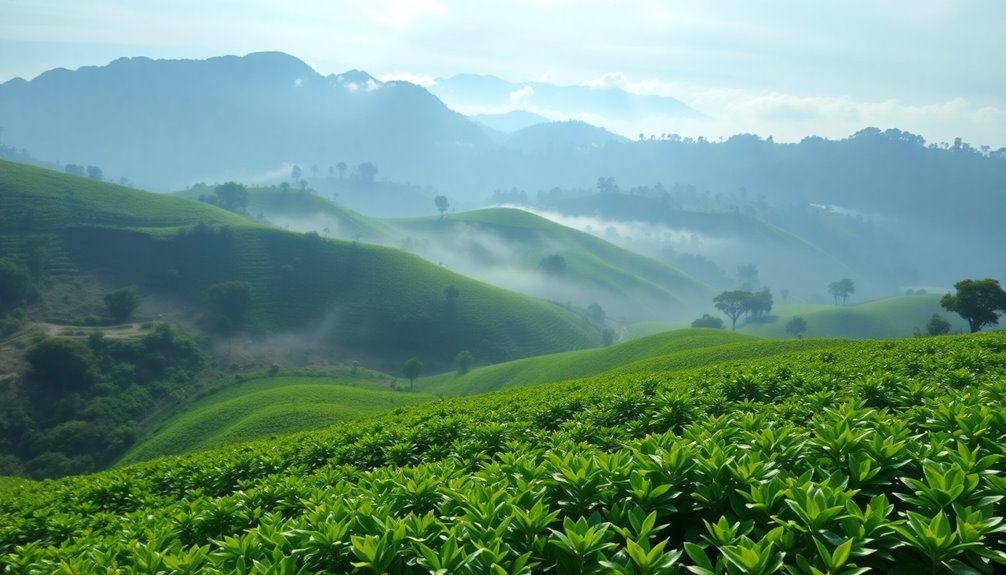
Tea lovers will appreciate the remarkable diversity of flavors found in Ceylon tea, thanks to its cultivation across various elevations in Sri Lanka. The unique flavor of Ceylon tea depends a lot on where the tea is grown.
- High-grown teas (above 4,000 ft): These teas have light, delicate flavors and often boast a honey golden liquor with lovely floral notes.
- Medium-grown teas (2,000-4,000 ft): These offer a balance between rich flavors and delicate notes, giving you a full-bodied experience.
- Low-grown teas (up to 2,000 ft): If you enjoy bolder tastes, these teas are perfect for you, providing strong, rich flavors and a dark reddish-brown liquor.
Each elevation brings its own special touch, enhancing the aroma and visual appeal of the tea. High-grown leaves might look silky and delicate, while low-grown varieties are robust and hearty.
This diversity in elevations not only makes Ceylon tea exciting but also creates a wonderful journey for your taste buds. Whether you sip high-grown or low-grown, you're bound to discover a flavor profile that makes you smile!
Enjoy exploring the delicious world of Ceylon tea!
Quality Variation Among Regions
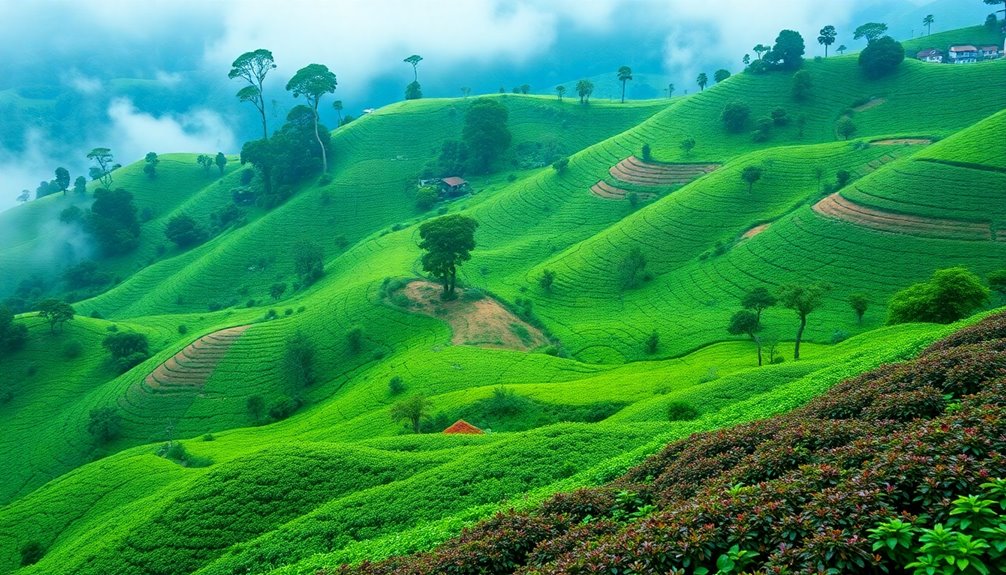
Frequently overlooked is the incredible quality variation among the different regions where Ceylon tea is cultivated. Each area offers its own unique taste that delights tea drinkers everywhere!
- High-grown teas: Regions like Nuwara Eliya produce delicate, citrusy flavors that are perfect for a refreshing cup.
- Low-grown Ruhuna: This region delivers strong, caramel-sweet flavors that make your taste buds dance with joy.
- Dimbula region: Known for mellow, refreshing teas, these have hints of jasmine and a lovely golden-orange hue.
- Uva teas: With smooth, woody undertones and a sweet finish, these teas shine bright with their amber color.
- Kandy teas: Full-bodied and robust, they boast strong hints of chocolate and a rich amber appearance.
All these differences come from the unique altitude, climate, and soil composition of each region of cultivation.
So, whether you prefer the bright notes of high-grown teas or the rich flavors of Kandy, there's a Ceylon black tea waiting just for you!
Explore these flavors of Ceylon, and you'll be amazed at the delightful variety each sip brings.
Practical Applications
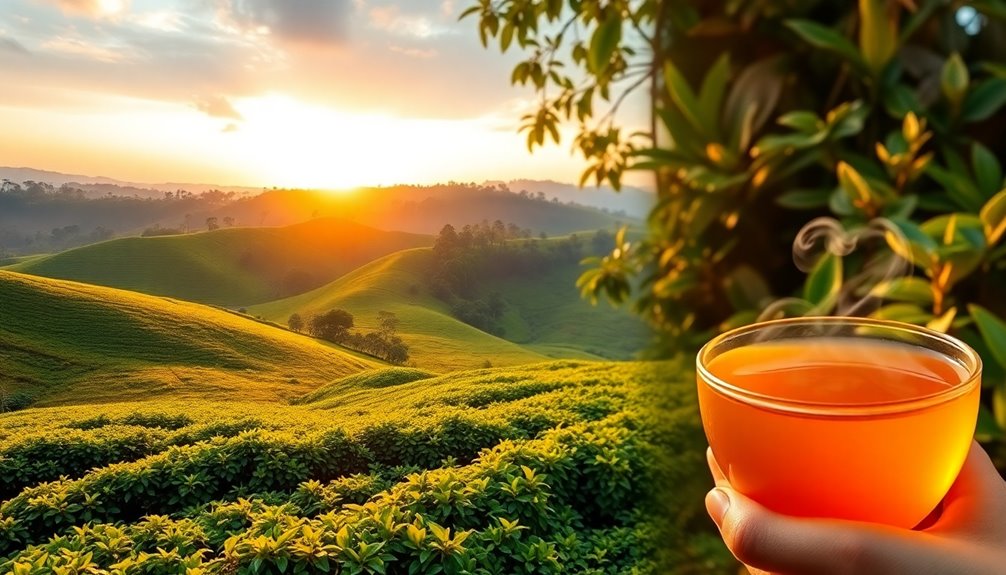
When it comes to enjoying Ceylon tea, understanding its flavor profile opens up a world of practical applications for your tea-drinking experience.
You can explore various types of Ceylon tea, from the delicate, floral notes of high-grown teas like Nuwara Eliya to the bold, full-bodied flavors of low-grown teas such as Ruhuna. Each type offers a refreshing taste that can brighten your day!
To get the best flavor, pay attention to the brewing process. Steep your tea for 3 to 5 minutes at a temperature of about 195°F (90°C). This helps release its unique aromatic qualities, making each cup a delightful adventure for your taste buds.
Feel free to experiment with sweeteners! Adding honey or lemon can enhance the flavor complexity, making your tea experience even more enjoyable.
Frequently Asked Questions
Why Does Ceylon Tea Taste Different?
Ceylon tea tastes different due to its diverse growing conditions. The elevation, climate, and soil composition shape its unique flavors. Seasonal changes and processing methods also influence the taste, creating a delightful range for you to enjoy.
What Is so Special About Ceylon Tea?
Ceylon tea's special because of its vibrant flavors and unique aroma. You'll appreciate the bright, brisk taste and refreshing aftertaste, whether you enjoy it hot or iced. It's a delightful experience for any tea lover!
What Are the Characteristics of Ceylon Black Tea?
Ceylon black tea's characteristics include a bold flavor, bright orange color, and refreshing aftertaste. You'll notice citrus and spice notes, while its caffeine content gives you that perfect invigorating boost for your day.
What Is the Difference Between Ceylon Tea and Regular Tea?
Ceylon tea differs from regular tea mainly in its bold flavor, vibrant color, and unique processing methods. You'll notice its diverse tasting notes based on growing altitude, making it a distinct choice for tea lovers.
Conclusion
Ceylon tea is truly special, and its unique flavor will make your taste buds dance with joy! Whether you enjoy the bright citrus notes or the lovely amber hue, there's something for everyone. Sourced from beautiful highlands, each sip tells a story of its region. So, gather your family, brew a warm cup, and share the delightful experience together. Celebrate the wonderful world of Ceylon tea, and let its flavors bring a smile to your day!

